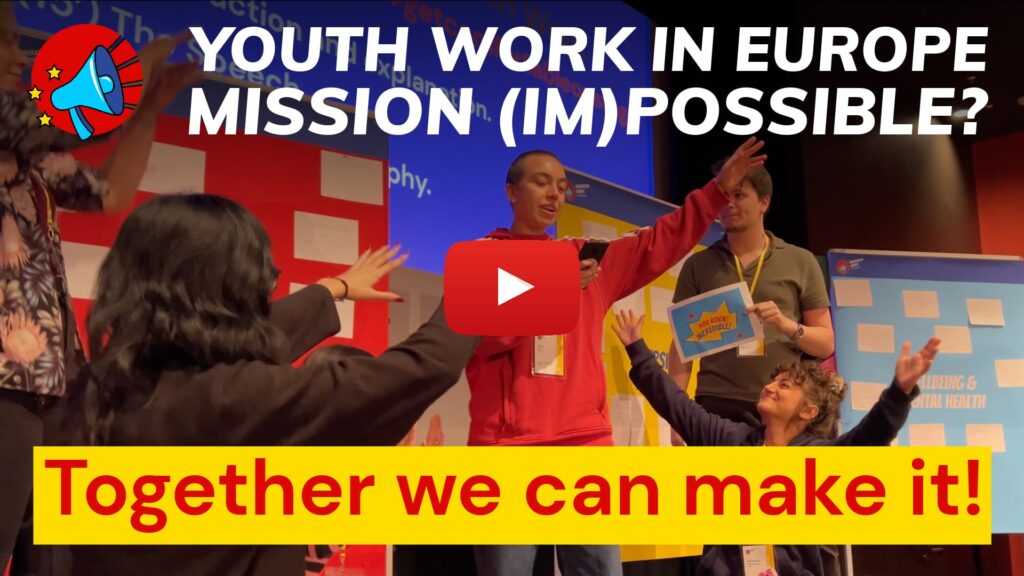Executive Summary of the results of the Symposium “Youth Work in Europe – Mission (Im)possible?”, by Prof. Dr. Tomaž Deželan
The current conditions for young people in Europe are catastrophic. Young people are among the biggest victims of the crises of the last decade, as evidenced by the “frozen progress” warned by the European Youth Forum.
To be precise, the youth employment rate is low, with a high proportion of involuntary fixed-term contracts, a quarter of young people in Europe are at risk of poverty or social exclusion and two thirds of them are concerned about their overall social and economic well-being. In addition, the cost of living, climate change and the spread of wars contribute to young people’s mental health being one of the biggest problems in the youth field, with almost one in two young Europeans having unmet mental health needs.
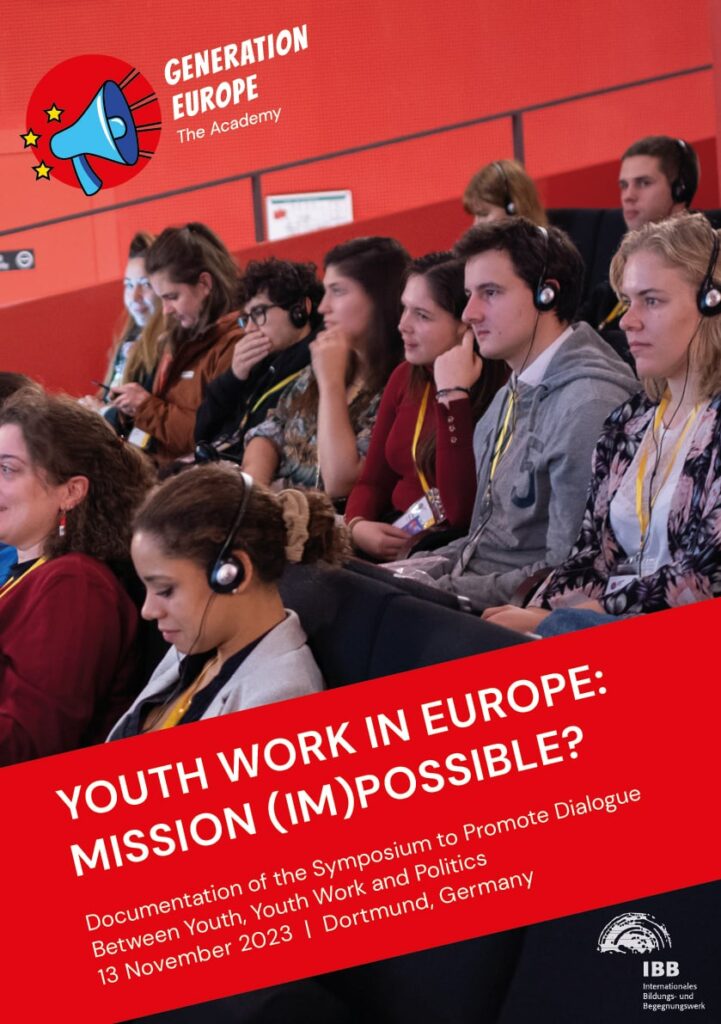
Youth Work in Europe: Mission (Im)possible?
Documentation of the Symposium to Promote Dialogue Between Youth, Youth Work and Politics
(Published by IBB e.V. | 1st ed. March 2024
48 pp. | pdf | 3,7 MB)
As governments fail young people, youth work is in a position to intervene and reduce the burden on young people by supporting their personal development, social integration and active citizenship. But youth work also suffers, as studies show that youth work needs more sustainable and operational funding and better recognition, especially in terms of its contribution to society. The 2nd European Youth Work Convention therefore called for the establishment of a European Youth Work Agenda (EYWA) to promote the further development, strengthening and quality of youth work, and the 3rd European Youth Work Convention in 2020 marked the beginning of the implementation of the European Youth Work Agenda – also known as the Bonn Process. In an effort to support and “bring the Bonn Process home”, the International Association for Education and Exchange (IBB e.V.) and Generation Europe pushed for stronger measures to improve the position of youth work (organisations), but most importantly to address the current grievances of young people across Europe.
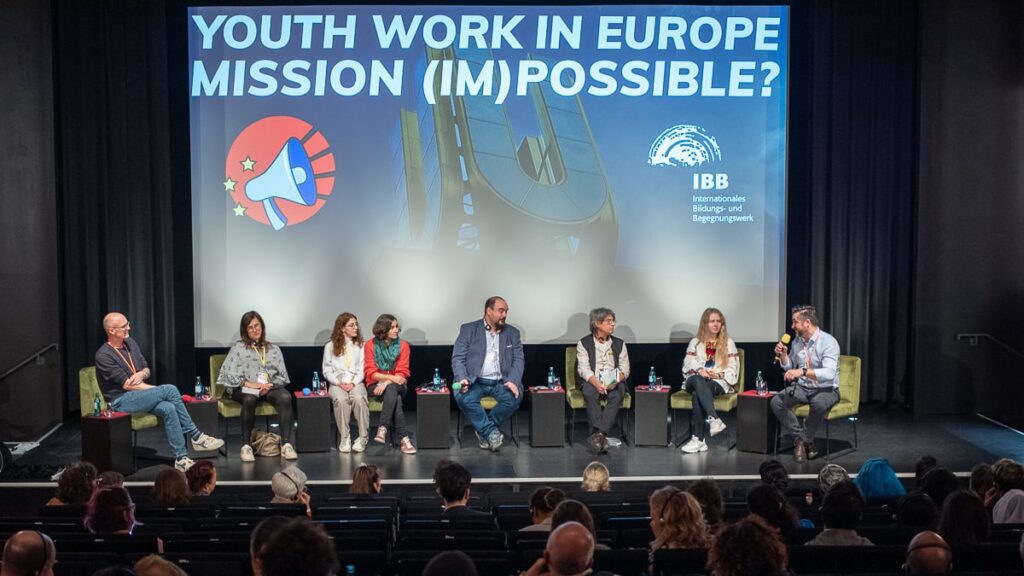
In an innovative symposium format, Generation Europe, an international network of youth work organisations committed to an active European civil society, provided a solid and active transnational multilateral and multi-stakeholder platform to support and further develop youth policy strategies in Europe. The symposium “Youth Work in Europe – Mission (Im)possible?”, which took place in Dortmund on 13 November 2023, is a prime example of this, as it followed the principle of the so-called youth policy triangle and included representatives from public authorities working within the mandate to design and implement policies, youth (work) organisations representing young people’s needs and concerns, as well as youth work practitioners and the academic community providing insights on the situation of young people. In addition, young people were placed at the centre of interest not only as a target group, but also as active co-creators of the solutions developed, also by training them in advance (so-called Youth Day) to enable an informed discussion at eye level.
The mixed working groups of the symposium – consisting of young people, policy makers, youth workers and academics – addressed burning issues defined during the symposium (civic education, diversity and inclusion, wellbeing and mental health, youth work as a profession and local youth work in Europe) and sought and discussed solutions to key challenges in the youth field based on knowledge informed by lived experience and expertise. In an endeavour to improve conditions for young people and youth work in Europe, the participants made the following recommendations to key stakeholders.

With an aim to improve wellbeing and mental health of young people stakeholders should:
- Create and promote new narratives of success (including in school settings) to alleviate the multiple pressures placed on young people.
- Implement strategies for the emotional education and training of young people to equip them with tools to manage stress and pressure effectively, including through the integration of mental health education into the wider curriculum and increased educational counselling.
- Provide platforms for open discussions about mental health, including through the creation of free, safe and professionally supported spaces for young people to meet and discuss mental health issues.
- Provide accessible therapeutic resources, including the availability of psychotherapists, to support those who need help.
- Initiate and support awareness campaigns to reduce the stigma associated with mental health.
- Improve access to adequate training opportunities for youth workers so they can effectively address the mental health needs of young people.

Promotion of diversity and strengthening inclusion has to be performed through:
- The need to work exclusively with people with functional diversity on measures to strengthen and promote diversity and inclusion.
- A better understanding of the mechanisms of social class and hierarchy and the ways in which they hinder the diversity of societies and inclusion of different groups experiencing multiple levels of exclusion (intersectionality).
- Creating educational tools based on respect for the different identities in a society, without them having to survive or adapt, but rather being accepted and brought together.
- Sharing opinions based on emotional connection, where peer-to-peer discussions and comments on differences and gaps are common.

To strengthen civic education, it is believed that:
- Civic education through youth work needs to be strengthened to achieve the goals of civic education that go beyond political literacy and participation in institutional politics.
- Recognition of the impact youth work on young people’s civic competence needs to be extended, including to civic educators (working in the formal education system).
- Non-formal education methods and approaches must become compulsory in civic education in the formal education system. Adequate financial and human resources support must be provided.
- Civic education activities must include skills to effectively communicate the feelings and thoughts of individuals.
- The democratic components of civic education must be defined and protected so that they cannot be confused with political positions.
- Programmes aimed at the exchange and mobility of young people and youth leaders need to be strengthened, also from the point of view of designing them in a way that truly supports young people’s participation in these activities from their inception to their evaluation.
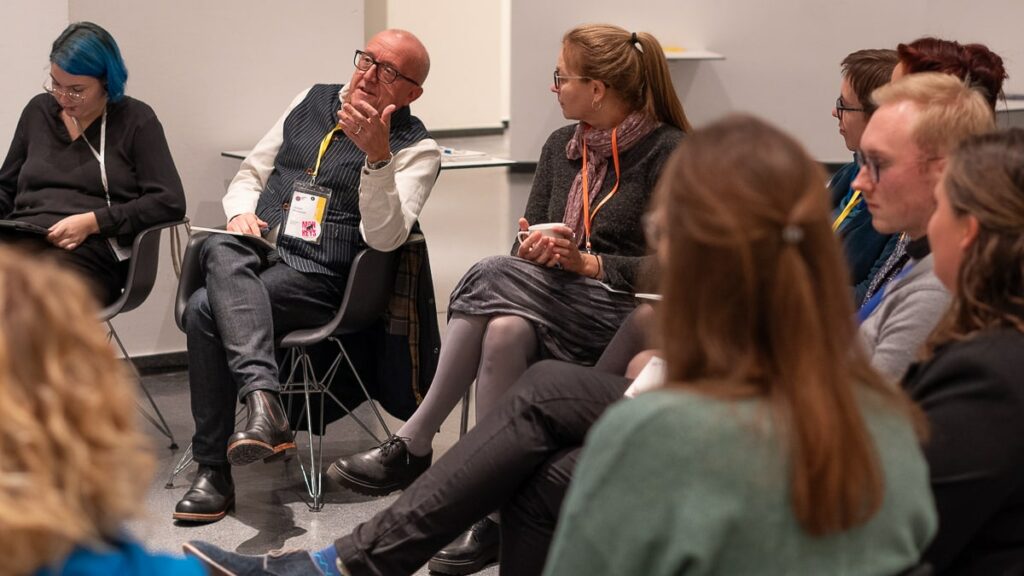
To improve youth work as a profession, it is called for:
- Creation of a pan-European interdisciplinary Master’s programme in youth work that includes a significant proportion of internships in youth work settings and has a strong international youth work dimension.
- Creation and implementation of a modular (re)qualification programme for a career change into youth work based on the European Competence Framework for Youth Work.
- Creation of a European Youth Leader Card for young volunteers in conjunction with the Discover EU Ticket.
- Launching of a pan-European campaign to demonstrate the positive impact of national and international youth work and its economic value, combined with increased efforts to strengthen the recognition of youth work and youth work outcomes.
- Improvement of the motivation of individuals to pursue a career in youth work by (a) demonstrating the positive impact of youth work on youth workers themselves and on society, (b) improving working conditions for youth workers, (c) strengthening the financial stability and remuneration of youth work professionals, and (d) improving support for quality youth work.
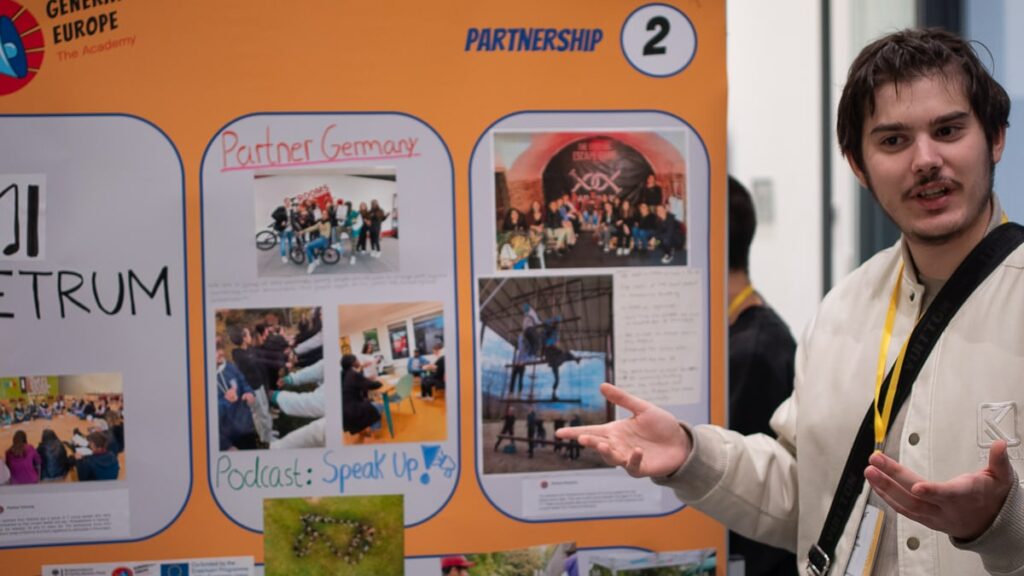
To improve the conditions for local youth work in Europe, there is a need for:
- Increased cooperation between schools and local youth (work) spaces to jointly implement activities that are geared towards the needs of young people.
- Increased funding for local youth work activities that have an internationalisation dimension and enable young people to experience intercultural encounters and thus acquire intercultural skills.
- Protecting and strengthening (virtual and physical) free and safe civic spaces that offer a refuge from intensive commercialisation and gentrification, especially for disadvantaged young people. Local youth work centres are prime examples of such spaces, which is why their existence and strengthening must be supported.
Prof. Dr. Tomaž Deželan is Chair of Policy Analysis and Public Administration at the University of Ljubljana.
Watch the Video Documentation
